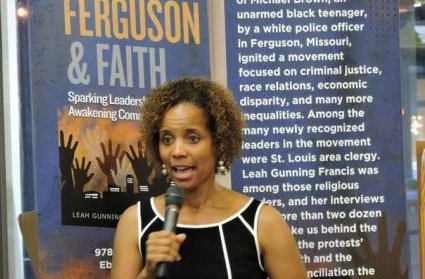The often asked question is, “What can I do?” Perhaps the more appropriate question is, “What can’t I do?”
TYRUS B. STURGIS
Interpreter Magazine
“What can I do?”
We often utter a response when things aren’t so good for someone. The words convey several sentiments: I understand how you feel. I’m here for you. I have a desire to help.
However, comprehension, presence and willingness are nouns, not verbs. That may be why the Rev. Leah Gunning Francis thinks we may be asking the wrong question.
Women whose actions have influenced the world have long inspired Gunning Francis. She met many while part of the Women of Color Scholars Program, a General Board of Higher Education and Ministry program that offers minority seminary students monetary support and mentoring.
“I had the privilege of meeting Bishop [Leontine] Kelly when I was a M.Div. student at Candler School of Theology. Her energy and powerful words were so inspirational to me, and she embodied the life of faith that I aspired to live,” says Francis.
Gunning Francis’ faith and work produced her first book, Ferguson & Faith: Sparking Leadership and Awakening Community (Chalice Press). Released in August, the book chronicles her interaction with faith-based activists in the immediate aftermath of the death of Michael Brown. The issues, including theology and leadership, hit close to home for Francis, who is an associate dean at Eden Theological Seminary in St. Louis, lives a short distance from Ferguson, Missouri, and has two young sons.
In a chapter titled “There is a Ferguson near you,” Krista Taves, a minister at Emerson Unitarian Universalist Chapel in Chesterfield — an affluent western suburb of St. Louis — says that her congregation expressed deep concern and pain for Ferguson and the divisions and conflict. “Everybody wanted to do something, but nobody knew what to do.”
“‘What can I do?’ is a question I receive after most Ferguson and Faith presentations,” Gunning Francis writes. “Recently this question came from a woman in a very affluent congregation as she wondered aloud about the improbability of any action making a dent in the massive problem of racial injustice. It was in that moment that I had sort of an epiphany — not because I hadn’t heard that question before, but because of the space in which that question was posed. As I sat in this well-endowed, well-kept and well-connected church, I began to wonder aloud about what she couldn’t do?”
As Gunning Francis began to “imagine a plethora of possibilities,” she wondered “if ‘What can I do?’ is the wrong question to ask. Too often that question leads us down a road of examples of failed initiatives and seemingly insignificant actions that cause people to throw their hands up and declare, ‘There’s nothing I can do!’
“I propose we ask a new question: ‘What can’t I do?'” she continues.
“That question challenges us to take a closer look at gifts, resources and opportunities in front of us and imagine the countless ways we can put them to use. This question challenges us to start from a place of abundance – to take stock of all of our resources we too often take for granted and begin to see our potential to make a difference as numerous as the stars in the sky. If we survey our personal and communal landscapes from a starting place of abundance, we position ourselves as agents ready to join God’s work of healing and restoration in a world fractured by racial injustice.
“Shifting from ‘What can I do?’ to ‘What can’t I do?’ not only changes our point of view, but emboldens us to move from helplessness to hope, from passivity to possibility, from apathy to action. Perhaps the next time you may be tempted to succumb to the ‘What can I do?’ posture, take a closer look at what’s in front of you, around you and inside of you, and you just might see a whole new world of possibilities before you.”
Last Updated on May 2, 2016

